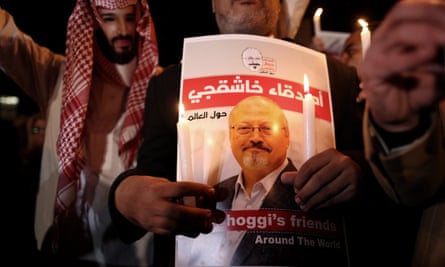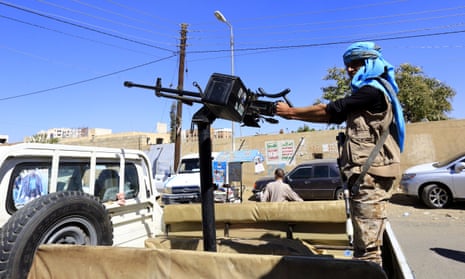Saudi Arabia has strongly rebuked the US Senate, accusing senators of unwarranted interference in the country’s internal affairs for claiming that the Saudi crown prince, Mohammed bin Salman, was behind the killing of the journalist Jamal Khashoggi.
US senators passed a measure blaming the prince for Khashoggi’s killing on Thursday and called on Riyadh to “ensure appropriate accountability”. Senators also passed a separate measure calling for US aid to the Saudi-led war in Yemen to be stopped.
The Saudi royal court tried to draw a distinction between the Senate and the Trump administration, but behind the warning was an inference that Saudi Arabia would seek allies elsewhere if necessary.
After changing its story numerous times, Saudi Arabia has claimed Khashoggi was killed on 2 October by a rogue team of Saudi agents in its consulate in Istanbul. The body has yet to be found and Turkey has rubbished the Saudi claim that the Saudi team exceeded their authority by killing Khashoggi.
Turkey claims the murder was masterminded by Saud al-Qahtani, one of the crown prince’s closest allies. Although Riyadh said Qahtani had been removed from his post, it is not clear if he is under investigation.
In a lengthy statement early on Monday, Saudi Arabia said the Senate’s resolution “contained blatant interferences” in the kingdom’s internal affairs and undermined its regional and international role. The resolution was based on “unsubstantiated claims and allegations”, the statement also said.

“The kingdom categorically rejects any interference in its internal affairs, any and all accusations, in any manner, that disrespect its leadership ... and any attempts to undermine its sovereignty or diminish its stature,” it said.
Such language is usually reserved for those who criticise the kingdom’s human rights record, such as for Sweden in 2015 when it reacted to the public flogging of a blogger, and Canada this year when it criticised the arrests of women’s rights activists.
But the statement was also tempered in saying the kingdom reaffirmed its commitment to relations with the US and describing the Senate as “an esteemed legislative body of an allied and friendly government”.
Saudi Arabia has rejected calls for an international inquiry into the killing, as well as appeals from Ankara for those responsible to be extradited to Turkey for trial. Riyadh says its own inquiry into the killing has begun, and the death penalty is being sought for some of the culprits.
On Sunday the UN secretary general António Guterres, speaking at the Doha Forum, called for a credible investigation into Khashoggi’s death, but did not define what would give it credibility. The UN human rights chief, Michelle Bachelet, has called for an independent international investigation.
Some governments have responded to the killing by threatening to end arms sales to Saudi Arabia, but the UK and France, two of Saudi Arabia’s closest allies in Europe, have avoided reprimanding the kingdom.
The Foreign Office has made the judgment that maintaining British influence in Riyadh, particularly over a Saudi-endorsed ceasefire in Yemen, is a bigger prize than alienating Riyadh by directly blaming the crown prince for Khashoggi’s murder.
The UK is also pressing privately that Prince Mohammed reorganise the Saudi security service so it is no longer his personal fiefdom. The foreign secretary, Jeremy Hunt, has said Riyadh must convince the west that such a murder could not reoccur.
In an apparent reference to Britain’s silence, the Turkish foreign minister, Mevlüt Çavuşoğlu, said at the weekend: “Many European countries, who are promoting freedom of media, freedom of expression, are closing their eyes.”
London points to Saudi Arabia’s castigation of the Senate as a sign of the loss of influence western governments will face if they publicly challenge Riyadh.
The US secretary of state, Mike Pompeo, has been accused of misjudging the degree of bipartisan hostility to Saudi Arabia in Washington, first by refusing to allow the CIA director, Gina Haspel, to testify to the Senate, and then by describing criticism of Riyadh as “caterwauling and media pile-on” in the “salons of Washington”.
The Saudi statement said the Senate’s position would not affect the kingdom’s “leading role in the region” and the stability of international energy markets, its counter-terrorism cooperation and its stand with the US in confronting Iran. It “sends the wrong messages to all those who want to cause a rift in Saudi-US relationship”, the statement said.









